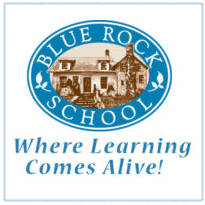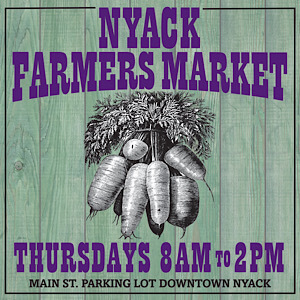 Earth Matters focuses on conservation, sustainability, recycling and healthy living. This weekly series is brought to you by The ML by Maria Luisa Scholarship fund, Strawtown Studio and Summer Play Camp at Blue Rock School.
Earth Matters focuses on conservation, sustainability, recycling and healthy living. This weekly series is brought to you by The ML by Maria Luisa Scholarship fund, Strawtown Studio and Summer Play Camp at Blue Rock School. If Earth Matters to you, sign up for our mailing list and get the next installment delivered right to your inbox.
by Susan Hellauer
A day after the February 14 shooting at Marjory Stoneman Douglas High School in Parkland, Florida, the Nyack Schools community received a letter from Superintendent James Montesano. As someone who helps care for a school-age child, I looked for reassurance in that letter, and found some. Teachers and staff are undoubtedly doing their utmost to keep students safe in buildings not designed to be fortresses. But what is really, tangibly being done to increase our children’s physical safety in school?
Gun control does help, but . . .
Strict gun control laws in New York State, from the 1911 Sullivan Act to the Sandy Hook-inspired SAFE Act of 2013, appear to have helped keep attacks in New York State at bay, according to a recent study of school shootings between 2013 and 2015. (The research also suggested that odds of school shootings were significantly higher in states like Florida that have lax gun registration laws and lower spending on K-12 education.) But a determined person can still cross state lines and return with a semi-automatic weapon, so some encouraging stats won’t totally allay parents’ worries about their children’s safety.

Superintendent James Montesano visits a classroom. Photo: Nyack Schools
To find out what’s being done to defend school buildings and their occupants, and how students with the potential to commit violence are being identified and helped, I spoke with Leonardo Macias, Nyack Schools’ Director of Special Education and Pupil Personnel Services. Macias, a 16-year veteran teacher and administrator, also serves as the district’s Chief Emergency Officer.
I know that the door is secured and monitored, and that windows and doors have been reinforced, but I still worry. I know you can’t go into details, for obvious reasons, but has the recent Parkland massacre changed the Nyack School District’s thinking about the physical safety of our school buildings?
Yes, the Parkland shooting has forced districts to re-evaluate best practices, how we communicate, and how we look at safety and security. You never want to take anything for granted, especially in areas as serious as this. Every school shooting, however tragic, is also an opportunity for us to learn.
We did have conversations about our preparations because of the specific scenarios that happened at Parkland. As a result, we are looking at anything and everything that can improve security, safety, and building accessibility. It’s time to re-examine what we are doing right, and what we can do better.
Will you consider arming any teachers?
No, we are not considering that.
Who works on the safety plans for our schools?
As Chief Emergency Officer, I oversee this–along with the Superintendent. Every school has its own emergency response team, and we have regular meetings at each school to discuss safety matters. And it’s not just Dr. Montesano and I sitting here making decisions. It’s really a collaborative process for all stakeholders: safety officers, administrators, teachers, support staff, psychologists, social workers and guidance counselors. We typically hold these meetings after a drill so that we can discuss things that need to be improved upon, or any need for further education.
How often do you run armed intruder drills at the school?
We’re required to have monthly drills on various emergency scenarios, including armed intruders, bomb threats, evacuation, sheltering in place, lockdown, relocating to hallways, fire emergency, and bus drills.
[Editor’s note: Two Nyack schools, Liberty Elementary and Valley Cottage Elementary, are in the Indian Point evacuation zone.]
We sometimes run these drills in coordination with the local police department, or safety experts from BOCES, who can evaluate us and determine what we need to improve upon. Sometimes they bring us a new perspective after studying a recent event, like Parkland. It’s really a coordination of county-wide effort to insure the safety of everyone in the school system.
What kind of school safety support do you receive from the state, county and municipalities?
A lot of our guidance comes from the health and safety coordinators over at Rockland BOCES; they meet with all the districts in the county. They help us determine best practices, as well as how, and how much, to disseminate information. Ultimately, all of our safety plans have to be approved by the New York State Police and the New York State Education Department (NYSED).
We are constantly working with our local officials, and we get strong support from Clarkstown Supervisor George Hoehmann, the Clarkstown Police Department, The Rockland County Sheriff, and all of our local municipalities.
How do you address those problems within schools that could lead to school violence?
Our first responsibility is to our own students. That’s why we have a “pupil support team”—psychologists, social workers and guidance counselors—who are intimately involved with the culture of a building.
We’ve run anti-bullying programs, and have made efforts to have students expand their social circles to be more inclusive and combat isolation and loneliness. We want every student to have someone to talk to—some point of contact. Our students feel safe with their teachers, and having conversations about their concerns, about themselves or other students, typically happens on a daily basis. And then there are parameters as home as well. So we do our best to foster social awareness.
What if parents are worried that their child or another child might pose a threat to others? If they report it the the school or other officials and the threat is unfounded, will there be repercussions for the reporter?
Unless someone is trying to defame someone else, no, there would be no repercussions. We will investigate any credible report, and would not come down on anyone who spoke out of concern.
If you do have a concern, it’s appropriate to have a conversation with the school principal. We’ll intervene and see what’s going on.
Parents know their children best. If they see any change in behavior, our schools are prepared to help. Parents can contact their school and speak to the psychologist or social worker about support available in the county.

A classroom in the BOCES [Board of Cooperative Education Services] network. BOCES provides vocational and academic education for adults and children, as well as safety and environmental consulting for school districts throughout Rockland County. Photo courtesy BOCES
How should we talk to our kids about school safety? At a certain point we can’t shield them from the fact of school shootings.
The question that you really want to ask a grade school child is: Are you comfortable in school? Do you feel safe in school, and with your teacher? It’s hard for a child at that age to process anything else. In middle school, the questions are a little different: Do you know what to do? Are you aware of the exits when you enter a room, or the gym, for example? If you are not in your classroom, do you know who will provide your instructions? If your child says that she or he is scared or doesn’t feel safe, have a conversation with your school principal, and have faith that they will address it.
Also, here in Nyack we have a psychologist in each school, and a guidance counselor in the middle and high school. There’s a full time social worker at Liberty Elementary and a social worker shared by Upper Nyack and Valley Cottage Elementary. These people are resources for everyone, and they make a point of going into the classrooms to introduce themselves and let the students know where they are. The whole school community can access their expertise.
In an emergency, how do Nyack school families get the information they need?
Communication will be disseminated from our central office, through email, text and robo-calls. There will be specific instructions on what to do and what steps to follow. Everyone on a student’s emergency contact card will get these notifications.
Nyack Schools have strict protocols in an emergency and will only release students to someone named on their emergency card. Parents should know that their child’s emergency contact card is not just for mom and dad. It’s really for anyone who could pick up their child in case of emergency—grandparents, aunts and uncles, friends and neighbors. Put every one of these people onto the student’s emergency card.
Those outside the school system can get information from municipal, state and county emergency alert systems, or from police department and municipal social media as well.

Monthly drills are part of the Nyack Schools routine. Photo: Susan Hellauer
Are there resources on the Nyack Schools website that can inform parents about your emergency preparations and plans?
On the district website, under the tab for “Parent Resources,” you’ll find our Safety and Emergency Plans. That’s where you’ll find our 2017-2018 District Wide Safety Plan.
The Behavioral Health Response Team (BHRT)
Rockland Paramedic Services Behavioral Health Response Team (BHRT) provides round-the-clock emotional and mental health crisis intervention for county residents.
A mental health professional and an EMT respond in an unmarked vehicle and plain clothes, to assist with any kind of behavioral health issue, including suicidal thoughts, anxiety or depression, school refusal . . . or threatening behavior.
Since its creation in 2015, BHRT has been called to homes, schools and businesses, and has served residents from 4 years old to 90+.
BHRT can be called by the person in need, or by family, friends, neighbors, or anyone concerned with an individual’s mental health. All interactions are strictly confidential, and, thanks to funding from the Rockland County Department of Mental Health and Refuah Health Center, there is never a charge for this service.
Call 845 517 0400 or toll free: 844-255-BHRT [2478]

Behavioral Health Response Team members answer calls in plain clothes and an unmarked car. Photo courtesy Rockland Paramedic Services
Learn more:
- New York’s State Safe Schools website
- “Talking to Children About Violence: Tips for Parents and Educators” (National Association of School Psychologists, 2017)
- SafeandSoundSchools.org: Empowering a Nation of Safer School Communities (founded by the families of the victims of the 2012 Sandy Hook school shooting in Newtown, Connecticut)
- “NYS PTA on School Security and Safety: Keeping Our Children Safe Always” (New York State PTA, March 7, 2018)
- “Alert student contacts authorities, potential mass shooting averted in Westport” (Westport News, 2/28/18)
- “States with background checks for guns, bullets less likely to have school shootings, study finds” (MinnPost, 12/7/16)
- “The Gun Control Debate after Parkland” (The New Yorker, 3/12/18)
- “Why Can’t the U.S. Treat Gun Violence as a Public-Health Problem?” (The Atlantic, 2/15/18)
- Rockland County Department of Mental Health resources
Email Earth Matters ![]()
Read Earth Matters every Wednesday on Nyack News And Views, or sign up for the Earth Matters mailing list.
Earth Matters focuses on conservation, sustainability, recycling and healthy living. This weekly series is brought to you by The ML by Maria Luisa Scholarship fund, Strawtown Studio and Summer Play Camp at Blue Rock School.











